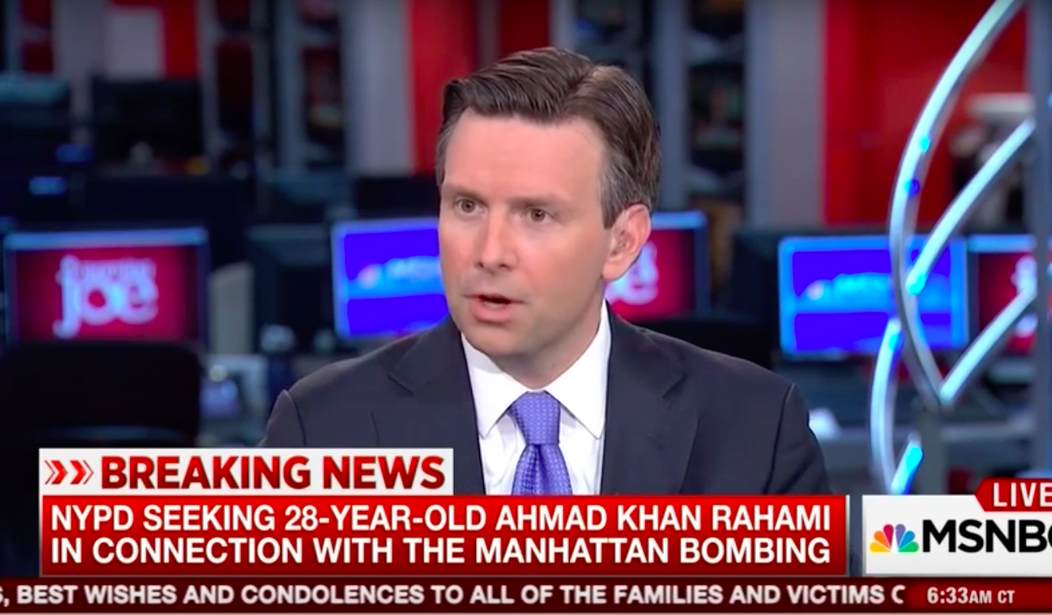How do we defeat the Islamic State (ISIS)? With a “counter-narrative.” Or so a key Obama administration official declared on Monday morning.
“In some ways, this is actually just a war of narratives,” White House Press Secretary Josh Earnest declared on MSNBC’s “Morning Joe.” He laid out two fronts in this war: the idea that ISIS is expanding territorially, and that America is going to war with all Muslims.
Before these remarks, Earnest first admitted on CNN that “We are in a fight with ISIS,” but he immediately added, “a narrative fight.”
Oy vey: Josh Earnest (CNN): "We are in a fight with ISIS — a narrative fight."
— Josh Kraushaar (@HotlineJosh) September 19, 2016
To his credit, Earnest laid out the military situation on the ground in Iraq and Syria. “More than 50 percent of the territory that ISIL had gained in Iraq has now been retaken by Iraqi forces. About 25 percent of the territory in Syria has been taken back. We’ve got intense pressure on their leadership, taking out two senior external ISIL plotters in the last couple of weeks,” the press secretary said, referring to the actual battlefield of the war. Even so, he emphasized the importance of such military events to the narrative, as opposed to the other way around.
“That counters the narrative that they’ve previously benefitted from of being an organization that was on the move,” Earnest explained. “Now they’re an organization that is on retreat because of the strategy that we’ve implemented. That goes directly to their narrative.” Yes, it may weaken the ISIS narrative, but the organization still holds land in both countries, and it still inspires lone-wolf (and not-so-lone-wolf) terror attacks across the world.
Earnest laid out another narrative battle as well. “We also can’t give them the narrative victory of suggesting that every Muslim is responsible for this kind of terrorism,” the press secretary declared. “We can’t give into this narrative that ISIL wants to build up, that the United States is at war with Islam.”
Earnest insisted that such a narrative is “false, that is not true.” Then he pointed to the “distressing rhetoric” in the campaign, likely referring to Donald Trump’s attacks on radical Islamic terrorism.
Even Trump knows better than to suggest that all Muslims are terrorists, however. His remarks on the issue have been scattered, and his original proposal for immigration restrictions mentioned “a total and complete shutdown of Muslims entering the United States until our country’s representatives can figure out what is going on.”
The caveat “until our country’s representatives can figure out what is going on” was important, but in classic Trump fashion, the Republican nominee later explained that he only wished to shut down immigration from countries of terror concern. Indeed, a report last month estimated that 30,000 immigrants come from “countries of terrorist concern.” To be clear, not all people from such countries are terrorists, just as not all Muslims are terrorists. But it may very well be reasonable to try to shrink this wave of immigration.
Trump’s current policies do not blame all Muslims for terrorism, and the conservative insistence on naming the threat for what it is — “radical Islamic terror” — also does not imply that all Muslims are terrorists. This website has reported numerous times on patriotic Muslims like M. Zuhdi Jasser. Indeed, Jasser even argued that Obama’s denial of using the term “radical Islamic terror” actually insults peaceful Muslims and supports Jihadis.
The real irony of Earnest’s comments, however, is not that the denial of the term actually harms the people he intends to help, but rather that he made these comments as police officers were tracking down Ahmad Khan Rahami, a suspect allegedly behind the recent bombings in New York City and New Jersey. Does this instance of what seems awfully likely to have been a radical Islamic terror attack feed ISIS’s narrative that the U.S. is at war with Islam? Or is it rather that ISIS’s ideology is at war with us?
Catch the video of Earnest’s remarks on MSNBC on the next page.
"We fight them in the paragraphs, we will fight them in the subtext, we will fight them in the footnote, we will… https://t.co/CRoJgSoUwm
— Dan Ornelas (@DanielMOrnelas) September 19, 2016









Join the conversation as a VIP Member